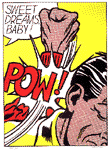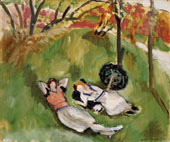Mixtape Marathon |
|

"In vacant or in pensive mood..." I am: Bekah; 24; Law Student / Favorite Things: Carbs (so there!), Johnny Damon, Smiling at babies, Grilled cheese, Comfortable silence / Favorite Supreme Court Justice: Brennan / Favorite Wilson: Owen by an inch / Today's Special: Song: Elliott Smith, "Bled White"; Quote: "You know, there's like a butt-load of gangs at this school. This one gang kept wanting me to join because I'm pretty good with a bowstaff." Please love me: mmbekah@yahoo.com 
The Innocence Project Vonnegut The Pretentious Partizan Fueled By Ramen Murmurs Hart Surgery FATMOUSE < ? law blogs # > Law School Stuff JD2B Wings & Vodka Ambivalent Imbroglio Life As Is A Mad Tea-Party Sua Sponte Life, Law, Libido The Wee Democracy Veritable Cornucopia Jewish Buddha Notes from the (Legal) Underground The Conglomerate Will Work For Favorable Dicta De Novo  Archives 
|
Saturday, March 22, 2003
Back to Square One Yesterday in Property my worst suspicions were confirmed: I have reverted to infancy. Yes, that's right. In my 23 years of existence, I have already come full circle. Last year, as a senior in college, I felt like I knew some things. I wrote a thesis, participated in some organizations, and took great classes. I felt like a moderately intelligent or at least educated person. Law school has taken this simple assumption, ripped it to shreds, pooped on it, put it in a blender, and thrown the foul remains into the pit of despair. I've been generally lost and confused all year, so before Property yesterday I had already pretty much accepted the fact that I knew nothing. But I always thought that this placed me on at least an 8-9 year old intellectual level. This was far too generous an extimation. I'm now fairly certain that I'm operating with the mental capacity of an eighteen-month-old infant. I was sitting next to my friend LaCosta. As the murmurings of the professor began to grow ever more distant, my attention turned to the brightly-colored drawstrings of my red hoodie. I looked at them with fascination, as if seeing them for the first time. I put one in my mouth. I touched the plastic coated ends and used my associative powers to make an incredible connection. "LaCosta!" I said, eyes wide, "They're just like shoelaces!" "Yes sweetie, they are. That's very good," she answered, patting me encouragingly on the back. She refrained from offering me some mushed carrots or wiping the drool from the side of my mouth. Later in the class, I began to get irritable. I felt a range of emotions, but the only ones I could identify were "tired," "hungry," and "go potty." I contemplated crying to express all three. Friday, March 21, 2003
You Know Who I Am, You Bastard! It’s the first day of law school. You don’t know anyone. You’re looking around with professed intention, absorbedly trying to locate your imaginary group of friends and/or boyfriend. You run into some random kid, introduce yourself, and end up talking for a while. By the end of the conversation, you know where this kid is from, what kind of dog he has, and the name of his 2nd grade teacher. Then you part ways. When you see him in the hall several weeks later, you barely get a nod. In a month or so, you only receive a blank, unresponsive stare. He passes by with his head down so as to avoid the dangerous prospect of eye contact. This scenario is just one of the infinite permutations of a phenomenon that threatens to be the downfall of American civilization. I like to call it the “I Don’t Know You” fallacy. For some reason, people often feel the need to hide the fact that they recognize each other. This isn’t only true in situations where it might be embarrassing to acknowledge whatever previous interaction you had with someone. In those situations (you know what I’m talking about, nudge nudge) it is perfectly reasonable to bow your head in shame and run away. What I’m referring to now are people who have no reason at all not to know you. And yet as they walk by in the hall, their cold, glazed-over expressions say, “I don’t know who you are, and even if I did I wouldn’t say hello.” For people who are supposed to be so smart, they have a suspicious defect in memory when it comes to other human beings. I’ve decided that there are two basic explanations for the existence of the “I Don’t Know You” fallacy. The first is laziness. People don’t always feel like getting into a conversation, and pretending not to know someone is a surefire way to avoid one. I have been guilty of this when I’m studying and don’t feel like dealing with anyone. I pretend to be too absorbed in my book to notice people, and if anyone happens to see me, they pretend not to. So we sit there in mutual denial, two tables away, each refusing to acknowledge the other’s presence. The other explanation is self-absorption. Nowadays, common decency takes a back seat to the urgency of our own daily lives. Instead of saying good morning to each other, we plow to class or work like linebackers. This is no way to live. I propose that we take a stand against this debilitating social illness. The next time someone pretends not to recognize you, point at them and scream, “You know who I am, you bastard!” You’ll have a crowd gathering around at this point, so you can follow up by giving a verbatim account of the conversation you had with them at the beginning of the year, or by telling everyone in the vicinity their 2nd grade teacher’s name. (“Tell Mrs. McAllister I said hello! Oh, and give Skippy a kiss for me, asshole!”) Mercilessly berating these people in front of their peers is the decent thing to do. They might be a little embarrassed to be called out, but they’ll thank you later. And more important, they will always, always remember you. Thursday, March 20, 2003
Meandering Ideologies Has anyone else noticed that the word “meander” is seriously overused? I think it has become the official “big word” of America’s youth. Instead of just walking around like normal people, those who are well-read and cultured have to meander. I really don’t understand why the prospect of ambling and/or winding has people so excited. Maybe they think it’s a good word for the way they move through life, just wandering along, hoping for direction. Still, I think the word has taken on definite pretentious connotations, and I am officially boycotting it. Meander meander meander. There. It’s out of my system. Also out of my system is attaching “esque” to anything. If the word is “statuesque” or the like, I’ll allow it. But bothersome constructions like “Marlon Brando-esque” or “Hemingway-esque” have just got to go. Other words and phrases fast approaching gross overuse include but are not limited to: bling-bling, “no-brainer,” ideology, true dat, and “thinking outside the box.” The Velour Jumpsuit: Evil Incarnate? JLo is currently heading up a Velour Conspiracy that is sweeping the nation with unprescedented speed. The outbreak is entirely uncontained, and is causing serious and quantifiable harm to myself and others. There is absolutely no excuse for any outfit composed of velour, in whole or in part. One would think that we learned this lesson well enough in the 70's and 80's. I would not feel so injured if JLo and those like her were the only people allowed to wear these so-called "suits." Then at least the only eyesore would be the appearance of the fabric itself. But the situation is exascerbated when those who have no business wearing anything tight, clingy, or light pink prance around in velour sausage casings. People, just look at yourselves! The danger is clear. JLo could successfully market garbage bag prom dresses and shoes with sandpaper soles. Someone has to stop the madness before she convinces everyone that horse hair soaked in pigs' blood is the new black. Wednesday, March 19, 2003
Not a Basketball Player I went to the gym yesterday and ended up walking in behind three women's basketball players. They were about 17 feet tall, wearing warmups and holding a bunch of basketballs, water bottles, and other equipment. The guy behind the counter swiping cards looked at them and said, "I guess you girls are on your way to the courts. Go on in." They didn't have to show ID. So as they walked through the turnstile, I strained on tiptoe to hand my ID over the countertop, cracked a smile and said, "Yeah, I'm not with them." The guy looked at me for a second, handed my ID back to me, and said, "No...heh heh." He was still laughing to himself when I walked away. And I was happy that my deficient stature could bring someone joy. Worlds Collide Both of my parents are professors, so I have a little bit of perspective on the breed. While it's sometimes hard for my friends to imagine that our professors have families and lives and interests beyond their job, I know from experience that they are actual people with actual human flaws. They are not one-dimensional figures who appear for an hour and fifteen minutes twice a week for the express purpose of driving fear into the hearts of law students. Professors also take their five year old daughter to My Little Pony movies and win gardening awards and listen to punk rock. So when a professor starts to intimidate me in class, I just think of his twelve year old daughter making fun of his pants. Who's so tough now, scary professor man? Bring it! Sadly, even my superior knowledge of the inner-workings of academia wasn't enough to prepare me for the encounter I had at the gym a few weeks ago. There I was, minding my own business in Spinning class--the one time of day when I can actually get away with not thinking about law school--and who should walk in wearing biking shorts and a tanktop but one of my professors! Not a young female professor. Not a young male professor. But an older male professor in his late 60's who looks a little bit like Santa! I am ashamed to say I averted my eyes. Now, I know my parents go to the gym, and I think that's great. But my parents are not my professors. This was like my professor reading my mail or asking me if I'm seeing anyone at the moment. It was just too personal. Needless to say, I don't go to that Spinning time-slot anymore. I feel far too violated. Flailing Around Speaking of professors, my Con Law professor is wonderful and brilliant and I adore him. I would even adore him if he didn't bear such a strong resemblance to Mo Rocca from The Daily Show. A few days ago we were discussing what judges do when there isn't any text in the Constitution that backs up their arguments. My professor explained that the judges have to "flail around" for arguments in that situation, basing them on structure, history, etc. Anyway, the point is that he put his arms out to the sides and said, totally deadpan, "I'm flailing. This is flailing. Look at me flailing." It was priceless. Nothing quite like a law professor doing physical demonstrations. It would have been even better if he'd gotten the whole class to stand up and flail in unison. That would have been magical. Like that scene in Angels in the Outfield. Monday, March 17, 2003
The Politics of the Grownup Table At large family gatherings, there usually isn’t enough room for everyone at the main dining table. To compensate for the missing seats, the adults set up a “kids’ table”: some sort of foldable number like a card table or a playskool carpenter’s bench. Around the kids’ table are the folding lawn chairs, the bathroom stepstool, and the living room ottoman. Underneath the kids’ table is a makeshift tarp of some kind, perhaps a garbage bag. The top of the kids’ table is littered with any combination of the following: gallons of grape juice (hence, the tarp), sippy-cups, Snoopy plates, diced carrots, mushed up Matzo balls sans broth, a peanut-butter and jelly sandwich, and/or fluff. The adults’ motivation for the kids’ table is clear. No one wants a five-year-old knocking back Manishevitz anywhere near grandma’s thousand-year-old tablecloth. But I think the kids’ table/grownup table partition causes some serious developmental issues. Issues that vex me to this day. The pivotal question is: At what point does one get promoted to the grownup table? As a kid, you’re psyched about the kids’ table. You don’t have to sit with your mom, and you can get away with not eating the broccoli without causing a scene. But then the fun is over. When you reach the age of thirteen or fourteen, adolescent discontent makes you resent being placed at the kids’ table. You spend these formative years trying to dissociate yourself from children, and then Passover comes and brutally shoots you back to childhood. So you sit at the kids’ table and fight with your sister about who gets the Snoopy plate. By the time you’re in high school, you are actually offended when seated at the kids’ table. You have a blowout with your mother about how no one respects you and you’re always treated like a child. And then you sit silently at the grownup table, listening to discussions you don’t understand about leftist politics or something interesting your uncle read in Scientific American. And you yearn for the Snoopy plate. In college, you come home and end up volunteering to supervise the kids’ table, because, frankly, you feel grownup enough. But you still feel slightly miffed at the idea, and your ears perk up when you hear the discussion about the new exhibit at the Met. You want to participate in the conversation so everyone can hear what you learned in Art History 101. Now that I’m in law school, I’m more confused than ever about where I belong. My grandmother invited me to dinner a few days ago and explained that it was just going to be my aunt and uncle and me: “just us adults,” she said. But this only confirmed my suspicions. It was as if she wanted to assure me that I am now worthy of the grownup table. It was too forced. When I truly belong at the grownup table, that fact will go without saying. And so, I remain in perpetual limbo. At this point, I think getting married might be the only way to break through the grownup table force field. Or maybe I should just settle this once and for all by having kids and making my own kids' table. No one can expect me to sit there! Sunday, March 16, 2003
I think I have an unhealthy relationship with my futon. Before my futon and I got together, I enjoyed sleeping as much as the next person. In high school I got very good at sleeping late, sometimes well into the early afternoon. Coming from a family of morning people, (not "Sounds like somebody's got a case of the Mondays!" morning people, but close), I was made to feel that 12-16 hours of sleep a night was somehow abnormal. My theory was, if I'm up in time for dinner, who's really getting hurt? In college I started cutting down on the hours and perfected the art of the power nap. I must confess that my friend Maureen taught me everything I know on the subject. Her method is simple: drink a cup of coffee immediately before your nap, then set your alarm for 20-25 minutes later, right when the caffeine hits. Boom! Rise and shine. It's a beautiful thing. My dad once told me that I was the only person he knew who could get out of a bad mood by taking a nap. And it's true. Sleep makes me so happy that after a nap I forget about whatever it was that was bothering me. These days, what with my mandatory early-morning study dates at the coffeehouse, I very rarely sleep late. The guilty law student feeling of "I should be doing something productive right now" always wins out. And unfortunately the nap isn't really an option anymore either. I have more to do, and I no longer go to class four steps away from my bed. But the 6-7 hours of sleep I get every night are more blissful than ever before. The reason? My futon. Futons have come a long way in the past decade. They used to be stiff and obtrusive. Not so anymore. My futon is more comfortable than any bed I have ever slept in. It is soft, but not too soft. It has a foam core. It calls to me when I'm in class. When I go out for the night, I gaze at it longingly, thinking about how long it will be before I can go to sleep. At bars or social gatherings, my thoughts return to my futon. I think about how my time could be much better spent with my futon. Unlike the bar-goers and their empty chatter, my futon doesn't need to speak. We communicate on a much deeper level. On the rare occasion that I can't fall asleep right away, I lie in my futon and think about how lucky I am to be consciously appreciating the beautiful qualities of my futon longer than usual. I take those opportunities to thank God for blessing me with insomnia. I often set my alarm early, just so I can have the satisfaction of returning to my futon for another hour. My futon is warm in the winter and cool in the summer, and it is always here for me. I am starting to think that I will never achieve this kind of companionship and mutual understanding with anyone other than my futon. This dependency is beginning to trouble me. When you start to devalue human contact because of your relationship with a piece of furniture, I think it's generally understood that the time has come to seek help. This is a big step for me. There's clearly only one thing to do. I'll sleep on it. |